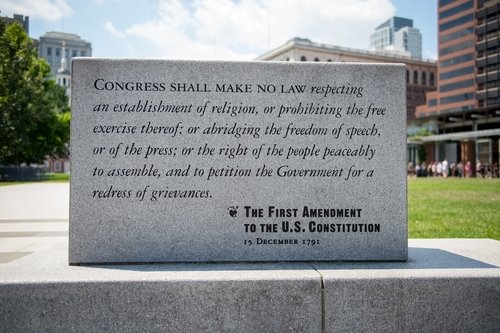The Practice of Democracy Through Citizen Assemblies
Blog Post

Sept. 26, 2025
The shocking assassination of conservative activist Charlie Kirk on a university campus last week has jolted the nation into confronting the fragility of public discourse—and the limits of free speech when threats of violence loom over political life. In the shadow of this tragedy, we need to invest and support new institutions that support civic voice and protect democratic engagement. Citizen assemblies, a model for engaging residents through civic lottery, are one such vital institution: a way of dignifying speech and reweaving trust in our democracy.
Unlike the adversarial debates that dominate our media and campuses, citizen assemblies bring together randomly selected, demographically representative residents in small groups to deliberate with experts and produce policy recommendations. In this way, they are a living extension of the First Amendment—they don’t just protect the right to speak, they structure more generative spaces for voices to emerge, be heard, and be acted upon. Especially now, when rhetoric risks becoming the dangerous fuel for violence, assemblies offer a path for communities to reclaim ownership over public life.
Globally and domestically, civic assemblies have already addressed climate policy, electoral reform, and land use. Here in the US, assemblies have been used to tackle long-standing local issues. For example, citizen assemblies in Colorado and California convened to determine the future of specific public land sites. Similarly, civic assemblies, a method which does not necessarily involve lottery based sortition, in Washington State have also played a significant role in setting policy agendas around climate issues. In this example, Washington State provided public dollars around climate resilience, which key civil society and grassroots groups were able to leverage to organize a people’s assembly. This includes intentionally over-sampling for traditionally underrepresented and marginalized communities. In the U.S., they have anchored local processes for redesigning public land or shaping resilience plans. These cases underscore how—for those often relegated to the margins—assemblies provide direct access to democracy.
But in our current moment, they carry deeper symbolic weight. Amid escalating threats, assemblies can offer a counter-narrative: a collective, grounded, citizen-led process that privileges listening over spectacle, deliberation over division.
In cultivating more citizen assemblies—especially at the local and state levels—philanthropy, funders, and civic institutions can play a key role. Citizen assemblies offer important lessons for building more resilient, inclusive, and sustainable democracy. They root First Amendment practice in community; build resilience against political violence; and launch a more grounded, participatory public square.
While residents are typically limited to shaping democracy from the outside – through voting, protests, or other forms of activism – assemblies give participants a hands-on opportunity to work inside the governing system. In this way, assemblies act as an amplifier for the First Amendment, offering a platform for people to use their voices to create more concrete change.
Citizen assemblies can also expand political power for felons, young people, noncitizens, and other residents who are not able to vote and are traditionally left out of many democratic processes. Additionally, at a time of intense political partisanship civic assemblies offer a genuine space for community members across lines of difference to voice their concerns. They even have a proven ability to reduce polarization.
At the same time, civic assemblies also provide a crucial education function: by engaging residents in dialogue with experts and by offering exposure to a diverse set of opinions, assemblies can help produce a more informed public. We need more, not fewer spaces, for people, across lines of difference, to come together and collectively problem solve.
There is no panacea for U.S. democracy. We need a multi-prong strategy that couples institutional reform with more opportunities for the practices of democracy to strength our civic muscles. Supreme Court Justice Brandeis famously called states the “laboratories of democracy” that could experiment with different ideas and policies. But they also have an important role as “gyms” of democracy, places where constituents and officials can build their civic “muscles” and practice the skills that underpin our form of government – like disagreeing. The habits of democracy create conditions under which people can have hands on civic training – a core foundation for civic life.
As a result, assemblies provide a powerful foundation for renewing democracy – and the First Amendment – by lifting up the voice of "we the people." By fostering common-ground solutions, even on the most contentious issues, they can also demonstrate that, when people have a chance to meaningfully participate, they are far less divided than traditional political forums and media narratives suggest.